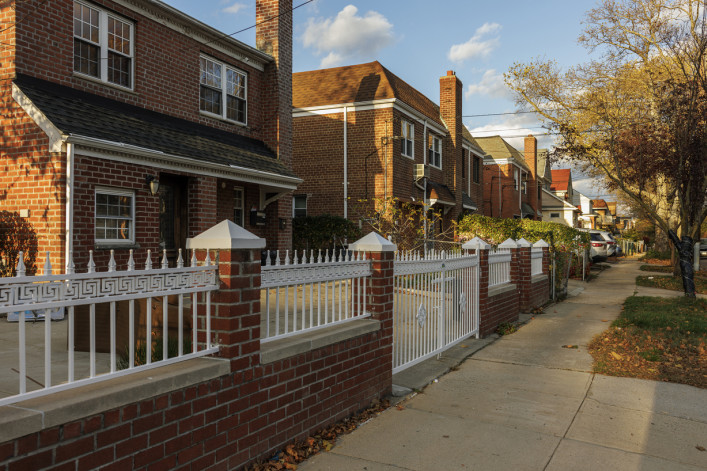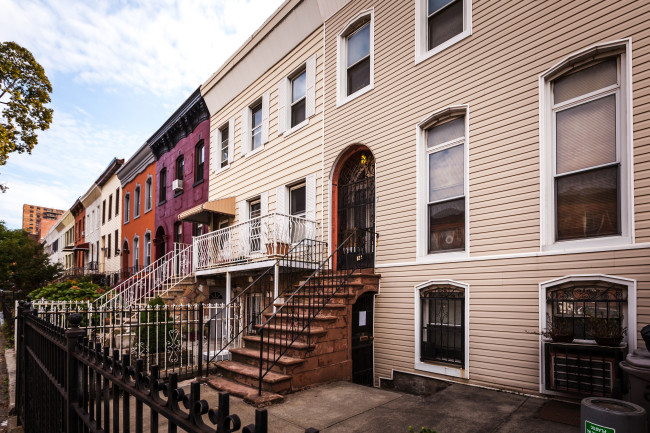A decade-long deed theft saga ends with victims regaining their Brooklyn properties
- Behind on mortgage payments, Black and Latino owners were tricked into handing over title to their homes
- Lenders backing the short sales ‘should have known that they were funding a predatory scam,’ court finds

In his ruling, Judge Edgardo Ramos removed a $650,000 lien with a 24 percent interest rate claimed by the hard-money lenders.
iStock
Imagine falling behind on your mortgage payments and an organization that says it will help you get back on your feet instead steals the deed to your house.
That was the nightmare perpetuated by the Homeowner Assistance Services of New York (HASNY) and its owners, which finally came to an end recently with a victory in court for two owners Vincent Holmes and Samuel Nyamekye. They fought for a nearly a decade to regain their properties.
Herzel Meiri and his son, Amir Meiri, along with five other defendants, operated HASNY from around January 2013 to May 2015. It targeted Black and Latino homeowners in the Bronx, Brooklyn, and Queens, and tricked them into giving up title to their homes, and in many cases filed eviction cases to remove them from their own properties, according to the court decision.
If you’re an owner, the case is a reminder that guarding against deed theft is just as important as protecting your property against fire or other hazards (more on this below).
Behind on payments and targeted by thieves
In his ruling, Judge Edgardo Ramos of the Southern District of New York removed a massive, $650,000 lien with a 24 percent interest rate claimed by hard-money lenders, Petermark II LLC and Advill Capital LLC, who funded the Meiris’ multimillion dollar scam and who claimed to have no knowledge of the Meiris’ fraud.
“These criminals targeted us,” Holmes said in his testimony to the court by affidavit. “They called us and forced themselves into our lives. They preyed upon us and took advantage of our struggles.” Holmes was represented by Legal Services NYC’s Neighborhood Economic Justice Project.
After Vincent Holmes and his wife Olive fell began to fall behind on their mortgage, a HASNY representative told them HASNY could help lower their payments and not to make those payments while HASNY negotiated with the bank. (Olive Holmes has since passed away.)
The Holmeses stopped making mortgage payments and provided HASNY with financial documents like utility bills and tax returns. They also signed documents at the HASNY office that they thought were necessary to lower their mortgage payments, but in fact transferred title to another entity controlled by the Meiris.
The role of a lender in deed theft
Deed theft, when criminals take the title to a home without the owner’s approval, comes in different forms, Rachel Geballe, a supervising attorney with the Neighborhood Economic Justice Project of Legal Services NYC’s Brooklyn office, told Brick. In this case, the thieves placed a lien on the property with the goal of getting even more proceeds through a short-sale scheme.
"But they were not interested in putting up their own money,” Geballe explained, and that’s where the lenders came in to provide the funds.
Judge Ramos found that the lenders knew or should have known that they were funding a predatory scam. He noted that the lenders “looked the other way” even when confronted with “numerous red flags” that indicated that the Meiris were trying to defraud homeowners.
For example, one of the lenders, Mark Pnini, a principal of Petermark and Advill, met with the Meiris at their office on Hillside Avenue in Queens. The office had a large sign outside and another inside that read, “Homeowner Assistance Services of New York.” According to the court ruling, when asked what he thought “Homeowner Assistance Services” was, Pnini testified that he “wouldn’t even acknowledge the sign.”
A name like that would indicate that this was an entity with a goal of helping owners, so taking on a loan with these properties as collateral would be a huge red flag, Geballe said.
Another red flag was the large number of violations on the property owned by Nyamekye—indicating a distressed property, something with which a hard money lender would not typically be involved. (A hard money lender focuses on the value of the property used as collateral instead of the creditworthiness of the borrower.)
Another one was a Uniform Commercial Code filing by the con artists, which is typically used to indicate you’re a secured party related to fixtures on the property, something a contractor might file.
“This means no one could resolve the title,” Geballe explained.
In 2018, Herzel and Amir Meiri pled guilty and the court entered a preliminary order of forfeiture for both Meiris. They agreed to forfeit their title to the Brooklyn properties, and several others. This summer the lenders filed petitions asserting their rights to the homes, but ultimately last month, the judge ruled they were “not bona fide purchasers,” ending the near decade saga.
Geballe shared several steps owners can take to prevent becoming a victim of deed theft.
Get early notice of a lien sale
If you don’t pay your property taxes, water and sewer charges, or other property-related charges, your property may be at risk of being included in a lien sale.
That means the City of New York sells your debt to an authorized buyer, who has the right to collect what you owe. At this point, your property has not been sold, but if you do not resolve your debt, the lien sale can be a first step toward foreclosure.
Owners can sign up for a Notice of Recorded Document Registration through NYC’s Department of Finance—this means you want to notified about deed and deed-related documents filed against your property.
Talk to a trustworthy legal advisor
Geballe urges owners not to sign any documents without showing them to someone they can trust, like the staff at Legal Services NYC—you can call 311 and ask to be connected to Legal Services or call 917 661 4500. Legal assistance is free for low- and moderate-income owners thanks to state funding.
Be on guard against unsolicited aid
Most importantly, if you are in financial trouble and someone mails you a flyer or shows up on your door to help, don’t assume this is the universe answering your prayers.
Geballe explained that con artists compile lists of owners who fall behind on their mortgage payments and then knock on their doors. That’s because when owners owe payments or are in foreclosure, that information is made public and is used by scam artists.
Owners may receive offers of assistance in exchange for a fee to “help save your house.” As Geballe previously told Brick, offers like these are yet another signal that you’re dealing with con artist, because legal assistance in New York is free for low- and moderate-income owners.
You Might Also Like






























